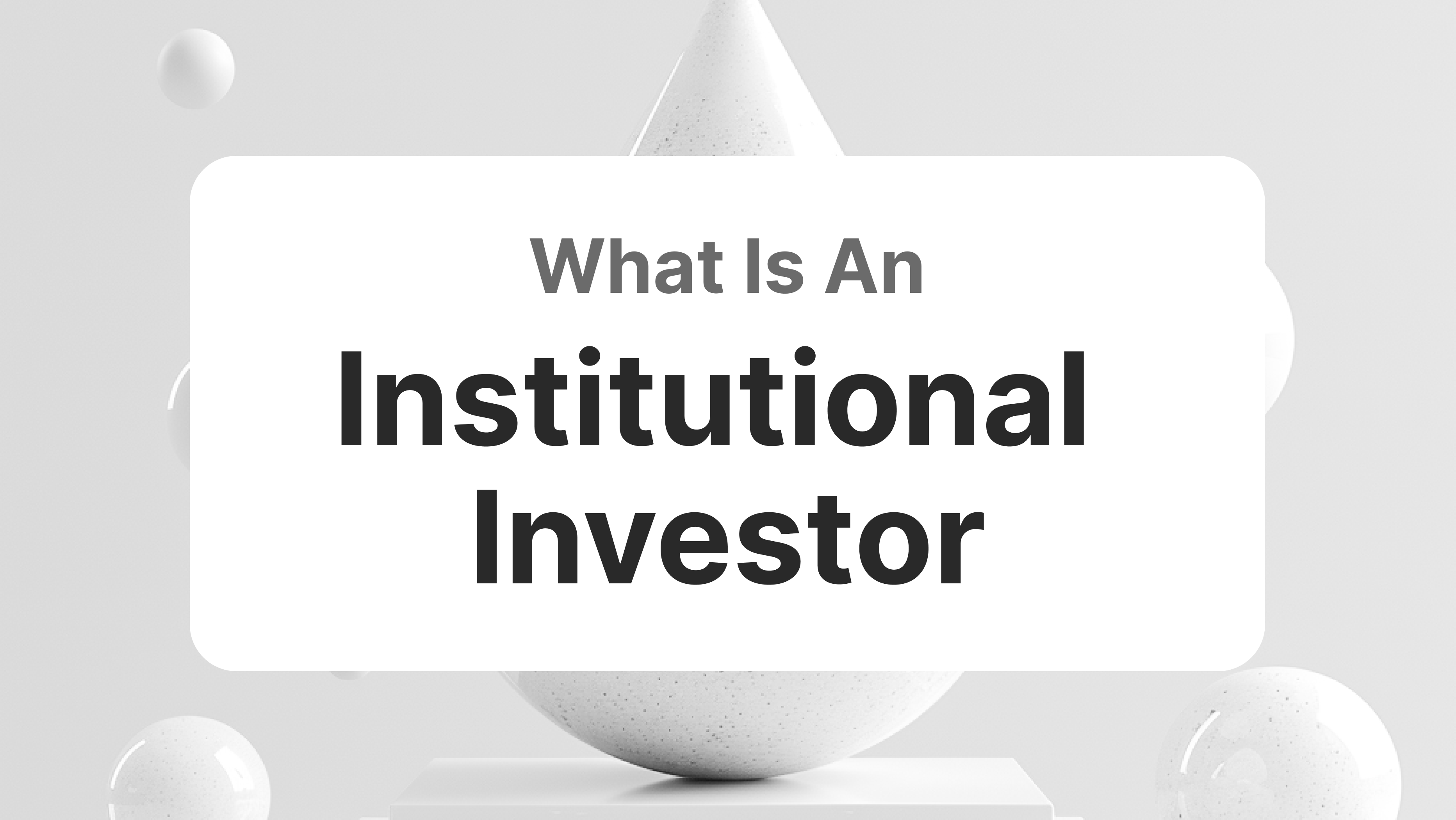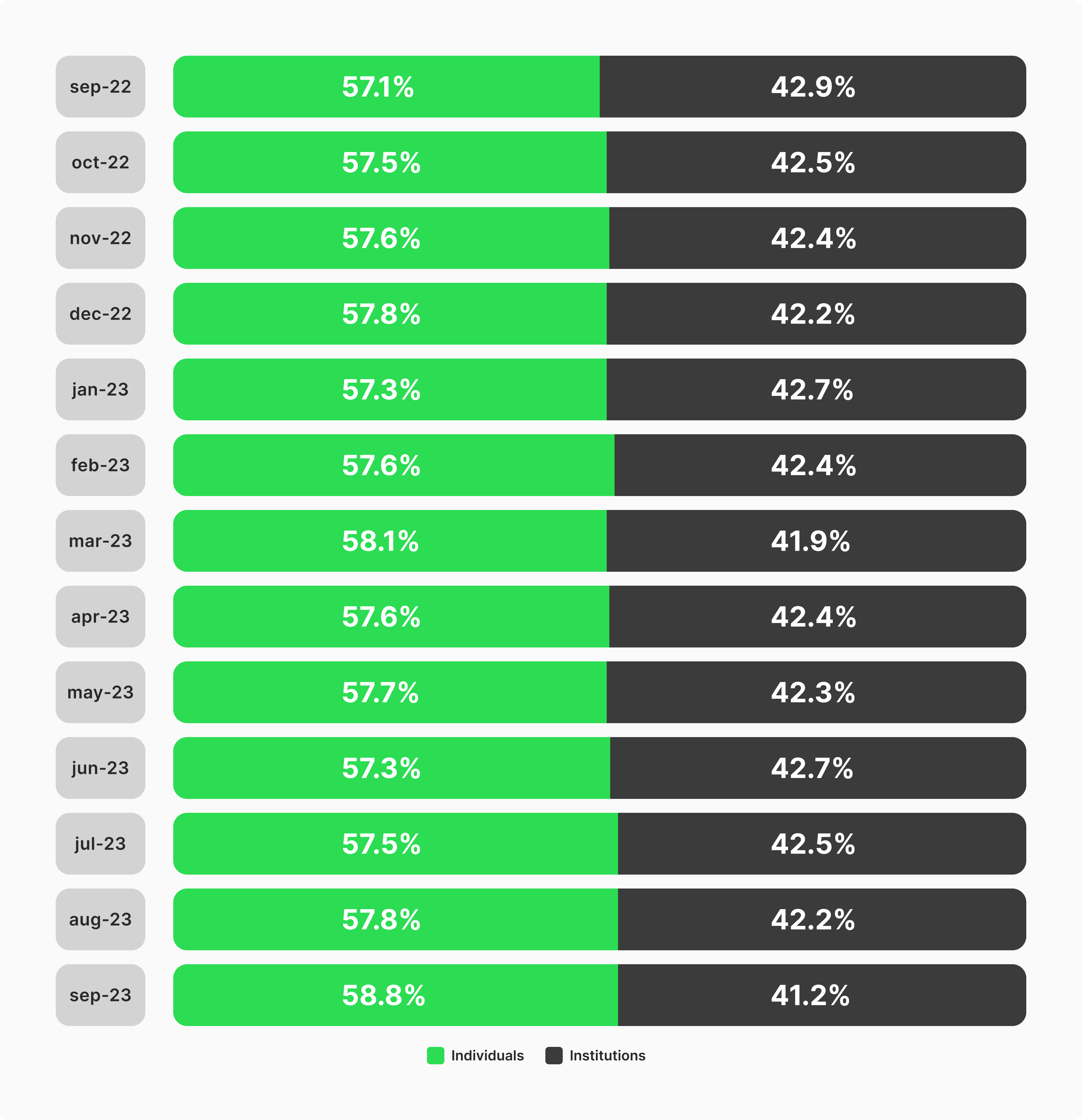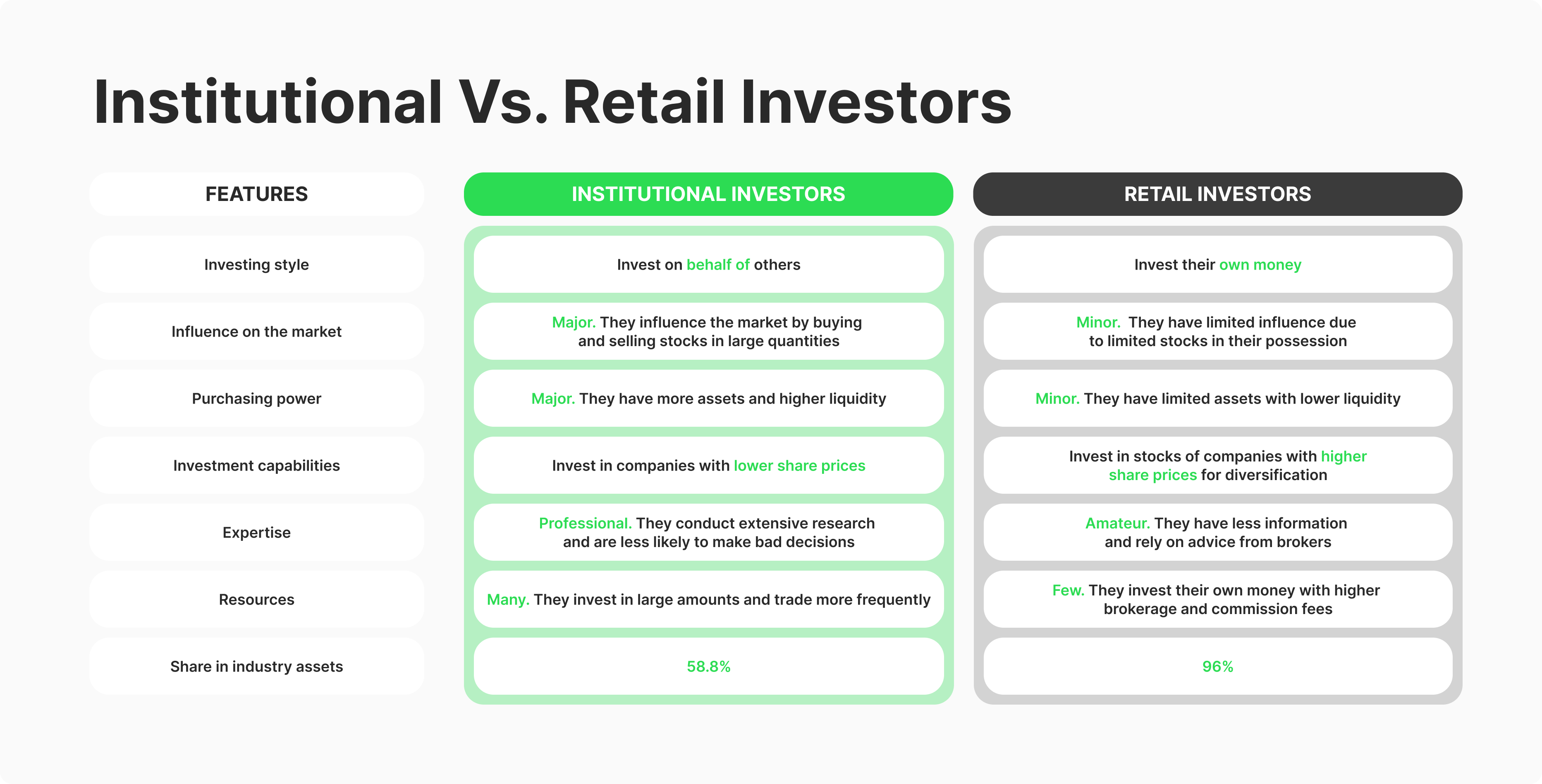What Is an Institutional Investor & How Does It Differ from a Retail Investor?

Being a person who is always eager to learn something new about the world and is fond of learning foreign languages, I had a lot of experience with text in various fields while working as a technical translator, technical writer for fintech products, and copywriter.
Tamta is a content writer based in Georgia with five years of experience covering global financial and crypto markets for news outlets, blockchain companies, and crypto businesses. With a background in higher education and a personal interest in crypto investing, she specializes in breaking down complex concepts into easy-to-understand information for new crypto investors. Tamta's writing is both professional and relatable, ensuring her readers gain valuable insight and knowledge.

Large-scale investors play a crucial role in shaping the stock market and can sway the investment of substantial amounts of money. Their work is similar to that of ordinary investors, but they also have many differences. Understanding these distinctions can aid individuals in selecting the most suitable career in finance and investing.
In this article, we will answer several questions, such as "What is an institutional investor?", "What is their role in the market?" and "How do they differ from retail investors?".
Institutional investors are large enterprises that trade securities on behalf of their traders.
Charitable funds, pension funds, banks, etc., are accredited investors.
Retail investors refer to non-professionals who make investment transactions through a broker or financial expert.
Despite many similarities, retail and institutional traders have significant discrepancies.
Institutional investors, also known as accredited investors, are large organisations that trade securities on behalf of their investors, allowing them to enjoy priority queueing and lower commissions in the market. Their professional activity is based on the interests and goals of their clients, and they manage a significant number of funds.
Accredited market players form an important part of capital markets, influencing it by taking or exiting positions in securities. They provide significant capital to various entities, potentially leading to high dependency on them.
These entities are run by professionals with access to the best data, allowing them admission to unregulated securities that are out of reach for the average investor.
Large financial firms have access to specialist knowledge and in-depth research. Their frequent and high-volume trading provides a reliable capital stream to brokerages, resulting in lower fees per trade compared to retail traders.
These investors buy and sell their institutional capital consisting of stocks, securities, forex, and bonds and are subject to fewer restrictive regulations than retail investors. However, regulators ensure these powers are not exploited and maintain a fair market for all participants. This helps prevent companies from bending to their demands and maintains a fair and transparent market.
Institutional asset management includes accumulating significant funds from various sources and investing them in stocks and bonds with the goal of making a financial gain. They want to make their stuff worth more and get money for their team.
Large investors significantly impact the finance markets due to their vast holdings in financial instruments. Their actions and decisions can affect market trends and the value of specific assets.
For example, they can influence the outcome of corporate transactions like mergers and acquisitions by either supporting or rejecting them. They can also engage in activist investing, using their position to influence company management decisions.
The institutional market brings stability and predictability through the long-term investment outlook. They play a crucial role in shaping the financial landscape and driving economic expansion.
Large financial corporations generate profits by investing in businesses, infrastructure projects, and other assets, providing capital for growth and job creation, which in turn boosts the economy. They also earn profits through interest income, capital appreciation, and dividends.
Some traders focus on short-term returns, while others aim for long-term value generation. Their ultimate goal is to generate significant returns while managing risks and providing market liquidity.

A mutual fund is an investment vehicle consisting of stocks, bonds, index funds, or other securities. Investors can purchase shares based on the security's price. The fund generates income through dividend payouts, capital gain from security sales, or the sale of the fund itself.
There are various types of mutual funds, including equity, fixed-income, balanced, and money market funds. Mutual funds have more government regulation than other firms.
These funds are well-diversified and provide protection in case a security underperforms. They are accessible to traders without proper knowledge and are made in liquid assets traded in the market. However, they have a major disadvantage: fees and expenses, which can reduce returns and affect performance.
Commercial banks invest their own capital and clients' capital in financial markets to generate returns and provide investment services. They offer a range of banking services, including investment management, lending, and deposit services. However, their investment strategies are often influenced by business objectives and risk management across all lines.
Endowment funds are commonly used by universities, hospitals, and charitable organisations, where principals donate to the fund, allowing the organisation to access investment income and a portion of the principal.
Accredited investors are investment pools created by founders or principals for specific needs or entity operations, often in the form of a non-profit organisation.
These funds have a long-term investment horizon and focus on preserving capital while generating enough returns to fund their activities. They support their organisations' operations and mission, but their investment strategies may be influenced by the need to preserve capital and generate income. Examples include Harvard University's endowment and the Bill & Melinda Gates Foundation's endowment.
Pensions are both retail and high-level investments, combining shareholders' initial investments and reinvesting capital over an extended period, similar to hedge and mutual funds.
Pension funds are organisations that manage retirement savings for employees and invest in assets to generate returns for their members' retirement benefits.
Pension funds allow both employers and employees to invest in securities, with two types: fixed-return pension funds and performance-based pension funds. Pensioners receive a fixed return regardless of the fund's performance, while employees receive returns based on the fund's performance.
Pension funds are unique among market players as their primary purpose is to provide retirement benefits, affecting their investment strategies and time horizons.
Insurance companies use policyholder premiums as an investment carcass, investing them into securities to generate maximum returns. These investments are significant as they collect multiple policyholders. The returns on these investments are then used to pay out insurance claims. Due to their large size, their investments are also large.
Insurance companies generate significant revenue from the "float," which is the aggregate amount of premiums paid without any claims. Until they need to pay the float out as a claim, they invest it in fixed-income assets like bonds and stocks.
Hedging funds are private investment funds that use various strategies, such as leverage and derivatives, to generate returns for clients. These funds aim to hedge against losses in the stock market. Like mutual funds, they reinvest capital from shareholders but with reduced regulation. They have illiquid periods where redeemable shares are unavailable, as per the SEC.
To invest in a hedge fund, an accredited investor must meet three criteria: have a net worth over $1 million, earn over $200,000 annually, or be a licensed investment professional. Most hedge funds have investment minimums between $25,000 and $1 million.
However, even after meeting these criteria, investors may still be denied investment.
Institutional investors and hedge funds have the potential for high returns and a wide range of investment strategies; however, hedge funds come with higher fees, less transparency, and higher risk compared to traditional investment vehicles.
Retail investors, also known as individual investors or retail traders, are non-professional traders who purchase assets like stocks, bonds, securities, mutual funds, and ETFs through a brokerage firm, investment adviser, or other financial professional.
They are motivated to invest to safeguard their future and build personal wealth through an investing strategy. Retail investors have a smaller purchasing power due to their personal earning ability, invest in smaller amounts, and trade less frequently than institutional investors. Retail investors offer several advantages.
Retail investors can invest in companies of any size and hold cash when prices are high, improving their potential return on investment. They focus on any investment category in their diversified portfolio and are keen on monitoring and nurturing their investments, unlike accredited traders who may not pay as much attention to their personal accounts or portfolios.
Despite investing smaller amounts individually, retail investors have a significant impact on the market due to their long-term and stable investments, providing capital to corporations when other financing sources are difficult.
However, there is global concern about safeguarding the interest of these investors to protect them from fraud and scams, making stock markets safer and more transparent. By protecting their interests, businesses can secure stable and long-term financing, allowing household savings to be used for productive means and capital to form rapidly.
Fast Fact
In 2023, retail investors' market size reached a peak of $1.51 billion in average daily volume, surpassing all historical highs, including those during COVID-induced trading.

While similar in basic terms, retail and institutional enterprises have many fundamental differences.
Thus, retail investors invest their own money in the stock market, while institutional ones invest on behalf of others. Also, these investors have more assets, expertise in investment management, and higher liquidity. They can influence corporate governance and contribute to systemic risk.
High-profile firms tend to invest in companies with lower share prices, while retail investors invest in stocks of companies with higher share prices for diversification.
Accredited investors do extensive research before investing and are less likely to make bad decisions, whereas retail investors have less information and mostly rely on tips or advice from brokers.
Large investors have vast resources: they invest in large amounts and trade more frequently, allowing them to negotiate better prices from brokers. Individual traders invest their own money, with higher brokerage and commission fees and are expected to make more behavioural and emotional errors due to their fewer skills and knowledge.
These differences are reflected in the retail investors' vs institutional investors' percentage. Thus, individual investors' share in industry assets has increased significantly, reaching 58.8% in September 2023 compared to 56.1% in September 2022. Accredited investors, comprising 96% of the assets, account for 41.2%, with corporates being the largest group.

Institutional firms are the primary sources of capital for publicly traded companies, providing expertise in various security markets and access to analytical tools. They can diversify investments, maximise returns, and reduce financial losses. They also assist individual traders in fundraising and encourage companies to adopt ethical business practices and be transparent about their financial operations.
Accredited organisations also receive preferential treatment in the market due to the large size of their investments, resulting in lower transaction costs and faster execution of orders. This saves time and money, ultimately benefiting the market participants in the investment pool.
Additionally, they have access to securities not available to other investors or small business clients due to federal securities laws. An example of this is an initial public offering (IPO), where the offering price is presented to select investors who meet certain criteria, and the opening price is available to anyone who wants to buy the stock on the open market.
Overall, institutional investors have more resources and access to securities than non-institutional investors, allowing them to make more informed decisions. Despite notable advantages, institutional investors have some limitations.
Thus, they have significant influence over the companies they invest in, which can lead to financial instability if they decide to withdraw their investment.
They also have a high dependency, as they provide significant capital to companies, reducing their reliance on retail traders. This dependency can significantly impact a security's price, as the market may perceive this as a warning sign.
Institutional investors significantly influence the market by buying and selling stocks and financial instruments in large quantities. Their trading decisions have a greater impact on asset prices than those of retail players.

Being crucial sources of capital in the economy, accredited investors provide large amounts of capital to companies without relying on many small investors.
Large investors pool their money to form a large entity that can invest on their behalf, providing benefits to individuals who cannot take positions in securities requiring large capital commitments. They have their own teams of highly qualified personnel who study securities and track markets, providing expert management for those lacking these skills.
Access to substantial funds allows institutions to manage investments more efficiently compared to individual investors. They greatly determine the company's potential for growth, profitability, and competitiveness. They adhere to specific guidelines when investing and prioritise safer, stable, and low-risk investment options.
Additionally, institutional investors hold significant market influence, as they can manipulate security prices by entering or exiting positions, potentially moving the market or the price of a security in their favour.
Institutions dominate the stock market, investing trillions of dollars annually for both beginners and accredited investors. Despite potential risks, they ensure the market operates effectively, making it liquid and affordable for everyday traders.
Institutional enterprises hold high institutional ownership stocks, making up a significant portion of the securities market. They trade in large volumes, are more sophisticated, and have fewer regulations than retail investors. Taking all the advantages and characteristics into account, the answer to the question "What is an institutional investor?" can be rather simple: an institutional investor is a market maker responsible for the market movement and health.
Institutional market players are often viewed as more cautious and less subject to regulatory scrutiny than average investors. However, they are protected by the Securities and Exchange Commission, just like other investors.
Retail traders can significantly impact market prices in situations like after-hour trading, penny stocks, and prolonged market trends despite not being able to move stock prices in large volumes individually.
Many institutional traders are now incorporating cryptocurrencies into their portfolios.
Vanguard Group, BlackRock, State Street Global, Fidelity Investments, and BNY Mellon are the top 5 financial organisations.
Share your queries in the form for personalized assistance.